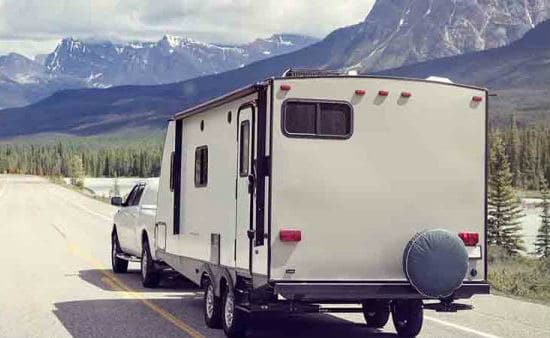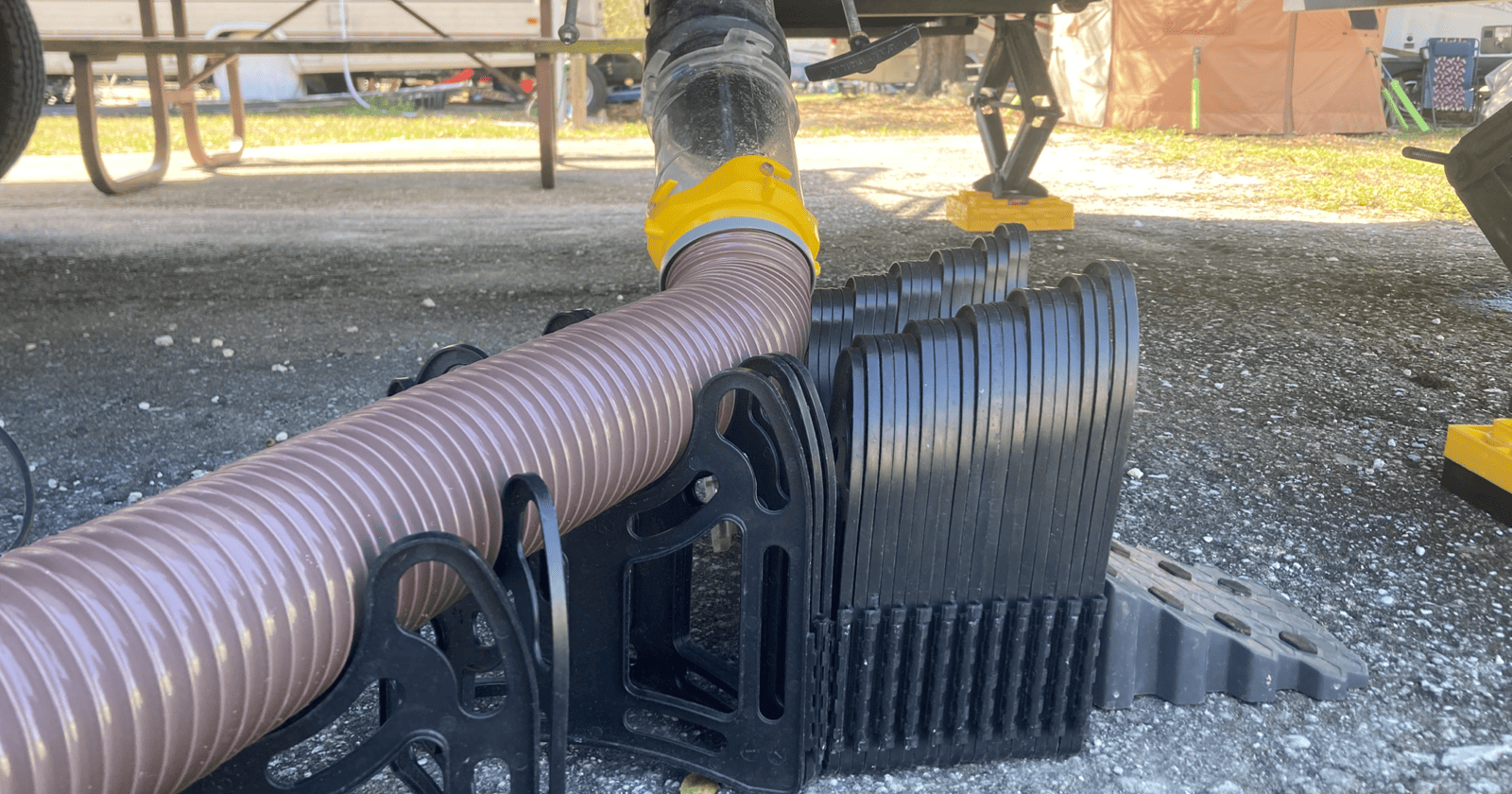There are a number of things to consider when buying a towable RV. One of the major points to consider is the weight of the camper. You may already own an SUV or truck, but can your vehicle tow the trailer or fifth wheel? Keep in mind that whatever the weight of the trailer is, you may also have to add at least 400 pounds of personal things and freshwater to that weight. If all of that weight brings your vehicle to its limit, there are things you can do to increase your towing capacity.
Know Your Weight Numbers
Towing at weight capacity can damage your engine or transmission. You don’t want to be in the mountains and find that one of your engine’s cylinder heads cracked in the middle of nowhere. Upgrading a few parts can save you thousands of dollars in repairs or having to replace your vehicle.
Before you start towing your RV, make sure you understand what your tow capacity is. If you check your owner’s manual or call your manufacturer, you will want to know what your Gross Vehicle Weight Rating (GVWR) is. If your RV is near the limit, these upgrades may benefit you.
Upgrade Options

There are many upgrades you can make to increase towing capacity. The goal behind these upgrades is to use stronger parts and to keep things from overheating.
#1 – Programmer
A vehicle programmer adjusts the settings to a vehicle’s computer to give you more horsepower and torque. It does this by changing the staging of your transmission shifting, air-to-fuel ratio, and other settings. Manufacturers initially program the vehicles to give better fuel efficiency. By adjusting these settings, you may gain horsepower but lose some fuel efficiency.
#2 – Radiator
The purpose of a radiator is to keep your engine and transmission from overheating. Installing a bigger radiator helps to keep these parts cool with the added stress of heavier weights. You will also want to combine this with new lubricants in the engine oil and transmission fluids to better diffuse the heat.
SUVs and trucks that have installed tow packages actually have two radiators. One for the engine and another for transmission. Upgrading both of these to bigger radiators will distribute the heat faster for better cooling.
#3 – Suspension
When towing, the weight of the trailer will push the back end of your vehicle down. Your suspension takes the majority of the weight. Upgrading your suspension system can distribute weight more evenly over all the axles of your vehicle instead of just the back end.
When you do change out your suspension to heavy-duty parts, you will also have a smoother ride and better steering control. Distributing the weight keeps more weight on the front end of your vehicle. When you are driving, the suspension will be able to take the bumps in the road giving you a smoother ride and do their job of taking the bumps in the roadway.
One option is replacing what you have with an air suspension system. The air bladders in this suspension system take the weight and absorb the shock from the road to give you better control.
Other options would be replacing your springs with more heavy-duty ones. Heavy-duty leaf springs add additional leaves in the spring to handle more weight. Coil springs can be replaced with thicker springs as well. A coil-over shock absorber can also steady your rear suspension and reduce the stress on your springs.
#4 – Axle
Overloading your axles can be dangerous. Replacing them with heavy duty versions can help you increase towing capacity. Make sure you also change out the differential to the appropriate heavy duty parts as well.
Another option is to replace your truck parts with RV parts. RV parts are made for heavy-weights and can fit on most trucks. When doing this, make sure to have it done professionally. If completed without the proper tools and training, they can become unsafe.
#5 – Intake and Exhaust
An engine that “breathes” better, performs better. Enhancing your exhaust system in combination with better air filters can give you the added horsepower and torque you need. For the best results, dual exhausts are recommended.
#6 – Brakes
Part of increasing towing capacity having the ability to stop heavier loads. The heavier the weight, the longer it will take to come to a complete stop. Upgrading your brake pads and rotors can handle the stress and friction heat that comes with the added weight.
Adding an electronic braking system can also help. These systems can sense which brake needs more pressure, and will increase the stopping power. As a result, your brakes work more efficiently and last longer.
Another way is to have a trailer brake control system. Without brakes on your trailer, your vehicle ends up taking the weight of itself and the trailer. By taking advantage of this device, the trailer not only stops itself but can also assist with stopping your vehicle, by creating a dragging effect which can relieve some pressure off of your vehicle brakes.
#7 – Frame & Chassis
Your vehicle’s frame and chassis are the skeleton of your vehicle. Your manufacturer takes these into consideration when determining the GVWR. If you over tax your vehicle with weight, it can twist or break your frame.
When choosing a vehicle for towing, generally a body-on-frame construction is better than a unibody. While a unibody does give you a more comfortable ride, they don’t give you the ability to adjust them unless they are designed for towing. Body-on-frame trucks and SUVs give more rigidity to handle heavier weights.
Upgrading your vehicle to increase towing capacity should be done on body-on-frame vehicles. Unibody frames are preset with what they can and cannot do. You want to make sure that your frame and chassis can handle the added weight. There may also be options to replace or reinforce some of these parts to give you the added advantage.
#8 – Hitch
Having the proper hitch is a major factor. There are different classes of hitches. Each one handles different weights. For example, a Class III hitch can handle up to 5,000 pounds. A Class IV can handle up to 10,000 pounds. Make sure that your hitch receiver is properly attached to the chassis of your vehicle. The chassis is the part of the vehicle that can handle the weight.
Fifth wheel hitches can handle more weight than rear tow hitches. This is why fifth-wheel RVs can be bigger and heavier. If you want to tow the heavy 40+ foot trailers, make sure you have the proper fifth-wheel hitch and plenty of room in your truck bed.
You may even want to upgrade your truck’s bed to a longer one. This allows the weight to distribute better. Also, it gives more room for your hitch to slide without damaging the bed.
Before You Consider These Upgrades
Manufacturers put a lot of thought into the GVWR. They look at the materials that the components are made of, the balance between performance and fuel efficiency as well as other essential things. When manufacturers balance these things out, they come up with a maximum towing capacity. When you increase towing capacity, you can add more stress to your vehicle’s components and lose gas mileage efficiency.
When you increase towing capacity, you are adding stress on your vehicle to the point of their maximum capabilities. Damaging your vehicle is a real possibility. This is why manufacturers do not recommend doing this. You can also void your warranty by changing-out factory installed parts.
Professional mechanics do not recommend these upgrades due to the safety and potential of damaging your vehicle. Any towing capacity upgrades should be done for small increases. If you need to tow more than 1,000 pounds, consider buying a new vehicle. Also, there are vehicle laws that prevent certain upgrades.
To give you perspective, current mid-size SUVs use a unibody frame because most of the time they are used as a family vehicle driving around town. These vehicles can average 5,000 pounds towing weight. Travel trailers under 24 feet can be towed with these SUVs without any upgrades.
Your vehicle must already have a pre-wired tow package installed. Wiring in the necessary electronics is a complicated and expensive process. Most service centers will not consider. It requires replacing parts and reprogramming the vehicle’s computer.
Upgrading parts to increase towing capacity can be a costly process. You will want to price out the upgrades and service costs to see the full picture. You may also want to price out a vehicle that has better pulling power.
If you do decide to buy another vehicle to tow your RV, there are many websites out there that discuss the towing capabilities of various trucks and SUVs. To keep costs down, you may want to look at purchasing a used vehicle. Many of these vehicles, new or used, have similar towing capacities.




